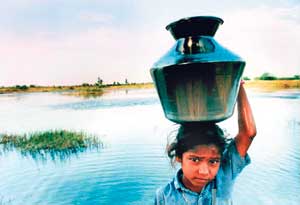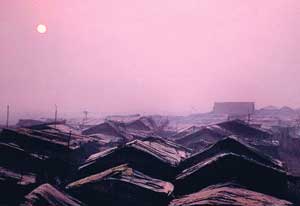
Ending the cycle"…I'm eight-years-old. I wear the same stained tee-shirt to school every day. The kids at school make fun of me and hit me with sticks. I can't fight back, because they are too strong. Ever since my father died last year, things haven't been the same. My mother says I'm her little shooting star and I can be whatever I want to be. I don't want to be poor anymore…." There are 2.2 billion children in the world, out of which, every second child lives in poverty. This is a serious issue, as poverty denies children their basic rights and weakens a child's protecting environment. It scars their lives with poor health, malnourishment and inferior physical and mental development. It depletes their vitality and threatens their future. It leaves no hope, only battle scars…
Like a hereditary disease, poverty is transmitted from one generation to the next. Generations of children have suffered the curse that was handed on to them by their destitute parents. Malnourishment causes mothers to bring under-weight babies into being. These children are prone to death, yet if they do survive by some miracle, they are unlikely to grow to their full potential. Poverty as an environment is harmful to a child's mental, physical, emotional and spiritual development. Children experience poverty with their minds, their hands and their hearts. Imagine starting your day without your bowl of cereal and glass of milk. Picture going to bed in a landfill site. Imagine having to endure hazardous labour each day to earn your next meal. Bringing about maltreatment of such children and impeding their participation in the world, poverty is a appraisal not only of children's misery but also of their disempowerment. This is why it is important to differentiate child poverty from other forms of poverty. "I don't think poverty can be defined in that sense, but the operational definition would be in relation to the dollar a day. It's the sort of standard used in a lot of places, so it makes sense to measure it that way so that we know if we are progressing or not. But you can't keep changing definitions," says Dhinesh, a young social activist in Sri Lanka. In his opinion, poverty is not solely a young people's issue, because even though there are young people who suffer because of poverty, in Sri Lanka, it's a general problem. "As for a general approach, I think the welfare schemes (samurdhi, etc.) don't work. I don't think "giving fish" welfare works – I'd be more interested in "teaching them how to fish" kind of welfare, which would be the better kind. Which would mean something like micro-financing should be given priority instead of handouts," he added. Pavithra does not believe that microfinance would "solve poverty", although, the concept can improve the current situation. "Ultimately it just boils down to just wealth creation, led by economic growth which will lead people out of poverty," he concluded. In a world where power and wealth reign above all, the impoverished obviously have no clout. Not only do they have no clout, they also lack the ability to meet their basic needs, which severely weakens their chance of survival. Poor children lack access to clean water around the world. Such deprivation makes them vulnerable to sickness and diarrhoea which, if not properly treated, can further reduce a child's body weight and resistance to disease. A child severely deprived of housing, living in a crowded home and a destitute neighbourhood, may not be able to absorb an education even if there are educational facilities available. Each year, tens of millions of impoverished children are victim to exploitation, violence and abuse. Some are kidnapped from their homes and recruited into armed forces. Some are trafficked and forced to work in prostitution. An estimated 1.2 million children are trafficked every year; 2 million children, are sexually exploited in the multibillion-dollar commercial sex industry. The effects of this exploitation are powerful and permanent; they rob children of their childhood and snatches away their hopes of a better tomorrow.
One of the most palpable ways in which poverty assists mistreatment is through child labour. Material deprivation creates economic needs that can force even the most vulnerable children, such as those caught up in armed conflict, are orphaned and made vulnerable by HIV/AIDS, into harmful labour, often at the expense of their education and childhood. Currently, 180 million children are engaged in the worst forms of child labour. The world presents its impoverished youth a multifaceted threat. Therefore, the response to poverty should be correspondingly extensive. The issue calls for an integrated approach to early childhood, which will greatly improve a child's chances of survival and capacity to succeed. Such a response should absorb a gender perspective into poverty reduction plans, fortify the safety of children at all levels and involve them in devising solutions for their problems. "Most people like working for kids because of the "feel good" factor, and so we see lots working with kids and young people facing various social difficulties. In my opinion, poverty cannot be addressed in isolation. Education, employment, cost of living, health care, are all an integral part of it all. So you need to essentially work on these issues," says Dinidu de Alwis, another young humanitarian worker. He believes that the issue of poverty can never be solved, because poverty is a relative measurement. "As long as one person is richer than another, poverty will exist. Lots of people associate poverty with rupees and dollars, but it should be based on whether a person is happy with the life he or she leads. So you need to focus on improving the quality of life, rather than eliminating poverty." He adds. However, the world seems determined to battle poverty. Many NGOs across the world including CARE, United Nations and Save The Children strive to make the world a better place for children in need. According to the Convention on the Rights of the Child, governments and parents are responsible of providing children with a protective environment to ensure their safety and dignity. "…Your fight against poverty stands a good chance only when we are free from exploitation and abuse. I don't think there is a quick answer: we cannot be vaccinated against abuse. But there is something you can do. You can lock away the bad people who hit us and make us do things we don't want to do. You can create for us a safe home…." |
|| Front
Page | News | Editorial | Columns | Sports | Plus | Financial
Times | International | Mirror | TV
Times | Funday
Times || |
| |
Reproduction of articles permitted when used without any alterations to contents and the source. |
© Copyright
2008 | Wijeya
Newspapers Ltd.Colombo. Sri Lanka. All Rights Reserved. |

